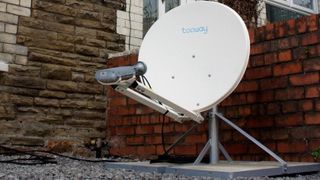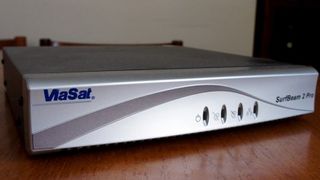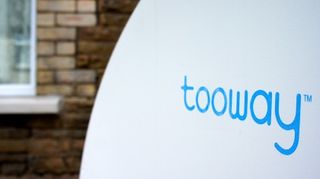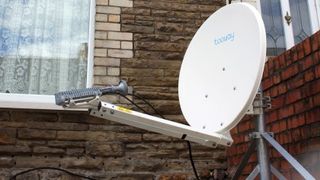
Modern spot-beam satellite broadband promises ADSL2+ levels of speed both for uploading and downloading. But can it deliver in practice and is it worth the outlay?
Despite the bellowing boasts of fibre optic broadband providers such as Virgin and BT about the 30Mbps+ speeds they're able to give their customers, much of the UK's broadband blackspots would be happy with 3Mb per second, never mind 10 times that.
The issue is line length. Once you're beyond two miles of copper phone line, even ADSL2+ starts to flag, and at 2.5 miles and beyond you're lucky to see 4Mbps.

Enter satellite broadband. We've looked at a system from Tooway and its latest Ka-sat high throughput comms satellite. Boasting spot beam technology, Tooway claims that its customers get 20Mbps downstream and 6Mbps upstream, no matter where they may live.
We're going to put those claims to the test and see how the latest Ka-band satellite broadband technology fares through sun, rain and peak periods.
Satellite broadband installation
If you've ever had satellite TV installed, the Tooway installation is pretty similar, with an external dish connected to an internal box, via a coaxial cable.
You can't use any old dish - the Tooway satellite broadband requires its own dedicated one, which is somewhat larger than a Sky dish, at 77cm (30.3 inches). This requires a clear view of the southern sky and it can be wall or floor mounted, depending on your circumstances.
Are you a pro? Subscribe to our newsletter
Sign up to the TechRadar Pro newsletter to get all the top news, opinion, features and guidance your business needs to succeed!

Tooway also provides a satellite modem and wireless router, so it's easy enough to integrate into your home or business. The precise wireless router model varies from supplier to supplier.
Subscribers will have a technician install the dish for them, and the longest part of the process is fixing the dish and routing the data cable. A final tweak of the dish's position is required to ensure maximum signal and so the highest throughput. The kit itself is leased, so when the subscription is up the dish, modem and router are returned.
Satellite broadband speeds: what can you get?
To test throughput speeds we used both the supplied Tooway bandwidth tool and an independent test through thinkbroadband.com. We're not only interested in seeing how speeds were affected at different times of the day, but also in seeing if weather conditions helped or hindered it.
The Tooway technician did say that even very heavy rain, while reducing speeds, shouldn't cause any outages. That's something they've only seen with heavy hail, which makes sense, since that'd effectively present a solid wall of ice for the signal to pass through. A summer heatwave prevented us from running any hail-based testing this time, and forced us to enjoy gin and tonics with internet browsing instead.
In general the claim of 20Mbps download and 6Mbps upload speeds are true on a technology front. We certainly had good periods of the day where we could reach and sustain these speeds. Less enthralling, though, is how the available speed ebbed and flowed during the day.

At around 9am averages were 15.5Mbps, with lunchtimes offering the fastest speeds of the day, peaking at 20.3Mbps before dropping at 3pm back to 15.81Mbps.
Moving to peak time, at 6.30pm speeds had dropped to 9.34Mbps and at 7.15pm they were down to 6.42Mbps. At 9pm speeds had recovered slightly to 8.35Mbps, and by 11pm it was back up at 16.66Mbps and heading back to 20Mbps. Interestingly, throughout the day upload speeds stayed solidly above 5Mbps.
From a practical point of view the 20Mbps claim is somewhat harder to sustain, with these speeds clearly only being available later at night and in the morning. The service does remain usable, since even during the evening period it was perfectly possible to stream iPlayer content without disruption, but for a busy household we'd expect it to start lagging.

The solid upstream results are at least reassuring, since you can at least rely on a constant upstream speed.
As for weather issues, it certainly isn't affected at all by cloud cover or light drizzle, proving to run just as fast as on a bright, clear day. We managed to test the system during a couple of torrential downpours, once at 10am and another around 2pm. Results came in between 12Mbps and 15Mbps download speeds, which could indicate a drop of up to 3Mbps, or 20 per cent.
Due to the distance the signal travels, latencies never dropped below 700ms and hovered around the 800ms mark. Even with predictive caching that makes web browsing speedy, there's always that near-second delay traversing pages. It's not annoying enough to stop you browsing, but it just doesn't feel as snappy as a landline internet connection.
Satellite broadband cost: is it worth it?

Tooway pricing starts at £19.99 for 2GB of data per month, £29.99 gives you a 10GB monthly cap, £39.99 gets you 20GB per month with unlimited evening downloads, £49.99 buys 30GB per month plus unlimited night time usage, and an all-you-can-eat 50GB option comes in at £74.99.
But the price is only half the story, since if you can't get a connection at all, or you can only get one that's limited to a sub-2Mbps speed, what's your option?
The Welsh government offers a subsidy for installation, for people who can show they have a broadband connection speed below 2Mbps. Unless you expect a local fibre consortium to arrive in your village any time soon, then certainly Tooway and satellite broadband offers a genuine - if limited and expensive - way to access broadband speeds no matter where you are in the UK.
Most Popular

